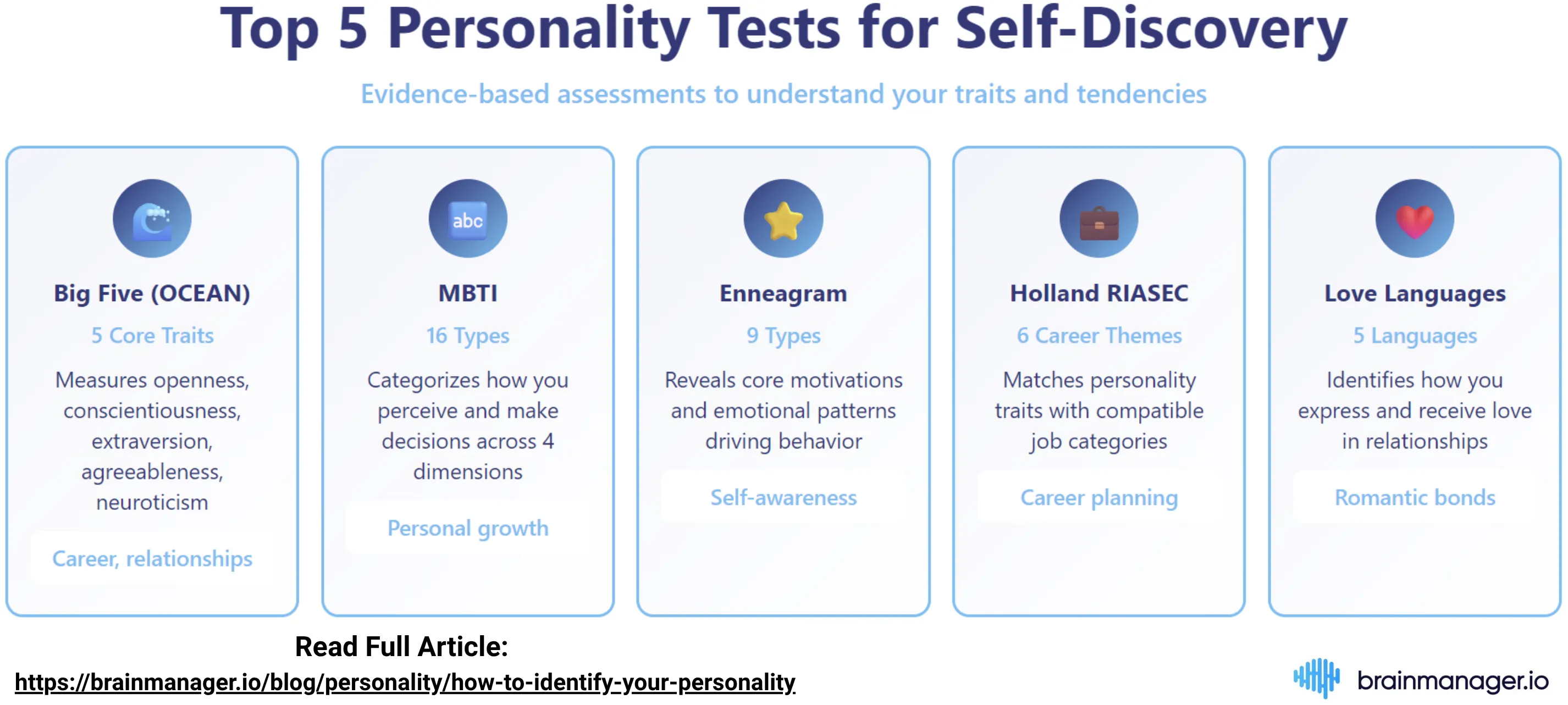How to Identify Your Personality: Top 5 Science-Backed Methods for Insights Into Traits, Career, and Love
Unlock the power of self-discovery with evidence-based tools to explore your personality! Dive into popular frameworks like the Big Five, MBTI, and Enneagram, and broaden your perspective with Holland’s career insights and Love Language tests. Gain valuable clarity to enhance your career choices, relationships, and personal growth journey.


Back
8 mins read
Want to understand your personality better? You can always rely on self-reflection or ask your friends and family. However, if you want psychology-based ways to identify your personality, you should take a personality test.
Personality tests, including self-report and projective tests, are vital tools for self-discovery and understanding your traits. From the widely used Big Five personality test to the Love Languages test that sheds light on your relationship with love, there is undoubtedly an evidence-based assessment that would fit your needs.
This article explores practical methods for identifying your personality traits. Discover tools like personality tests, behavioral observations, and the Enneagram to unlock insights into who you are.
Personality Testing: A Gateway to Self-Discovery
Personality can be defined as a complex notion encompassing our traits, interests, motivations, values, capacities, emotional patterns, and self-concept.
Personality assessments are a widely utilized psychology-based resource for exploring the nuances of personality. Personality testing can benefit you, from understanding your own behavior in various situations to determining the path to take in career or interpersonal relationships. Some are also used in clinical settings, such as the Minnesota Multiphasic Personality Inventory (MMPI).
Personality theories have yielded various personality models and different personality assessments. Gordon Allport suggested a complex model of over 4,000 personality characteristics. Raymond Cattell established 16 base traits statistically, while Hans Eysenck proposed only three.
There are three main ways to assess personality: self-report personality assessments, projective tests, and personality assessments based on observed behavioral patterns.
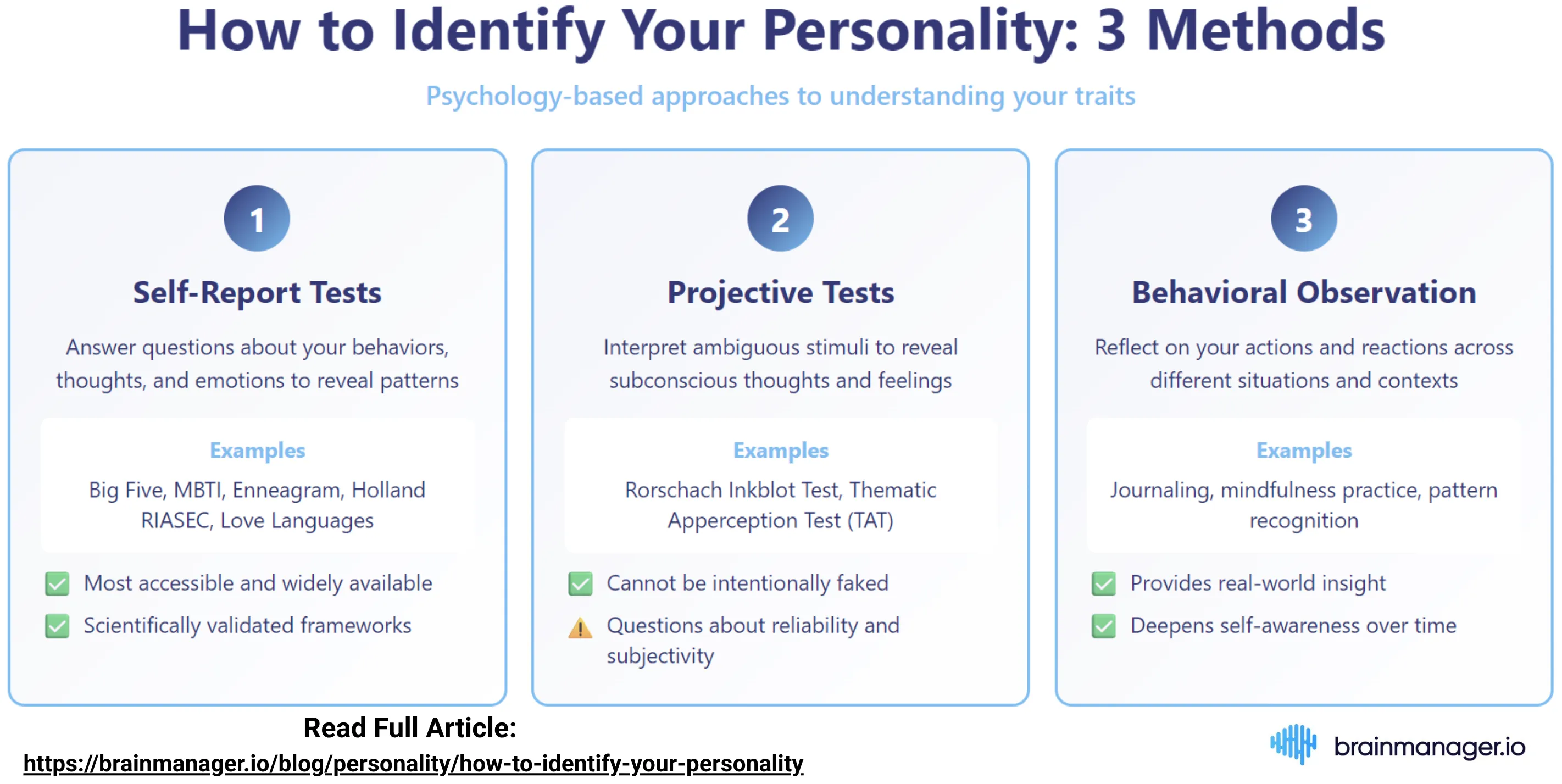
Self-Report Personality Tests
Personality tests that utilize the self-report method are prevalent and readily available tools for personality assessment. These personality inventories require individuals to respond to queries that best describe their actions, mental processes, and emotions.
Each of the personality tests we detail in this article relies on self-description.
Projective Tests
Projective tests provide an alternative method for evaluating personality by exposing hidden thoughts and feelings in the subconscious. These assessments employ stimuli with unclear meanings, like those found in the Rorschach Inkblot Test or the Thematic Apperception Test (TAT), which are also used in clinical psychology.
With projective test items, one cannot intentionally provide false answers. Still, projective tests often face scrutiny over concerns regarding subjectivity and questions about their reliability.
Behavioral Observation
Behavioral observation — paying attention to and reflecting on your behaviors in different contexts — can provide a deeper understanding of your personality. Journaling or engaging in mindfulness can help you recognize recurring patterns inherent to one’s personality.
Our Top 5 Ways to Identify Your Personality
Understanding your personality is the key to unlocking your true potential, improving relationships, and making informed decisions about your life.
With so many tools and tests available, finding the right approach can feel overwhelming. That’s why we’ve narrowed it down to the top five methods that offer deep insights and practical results.
These tests provide invaluable insights, whether you’re exploring how you communicate love, align your career with your natural talents, or uncover how you process emotions and make decisions. Let’s explore the tools that can illuminate your path to self-discovery!
Identify Your Psychological Core with The Big Five Personality Inventory
The Big Five framework is pivotal in personality psychology. It provides a reliable structure for examining human personality characteristics.
Encapsulated within this model are five fundamental personality dimensions commonly abbreviated as OCEAN. They were distilled from an analysis of approximately 18,000 personality terms. Their repeated emergence in psychological research studies and across cultures established their significance.
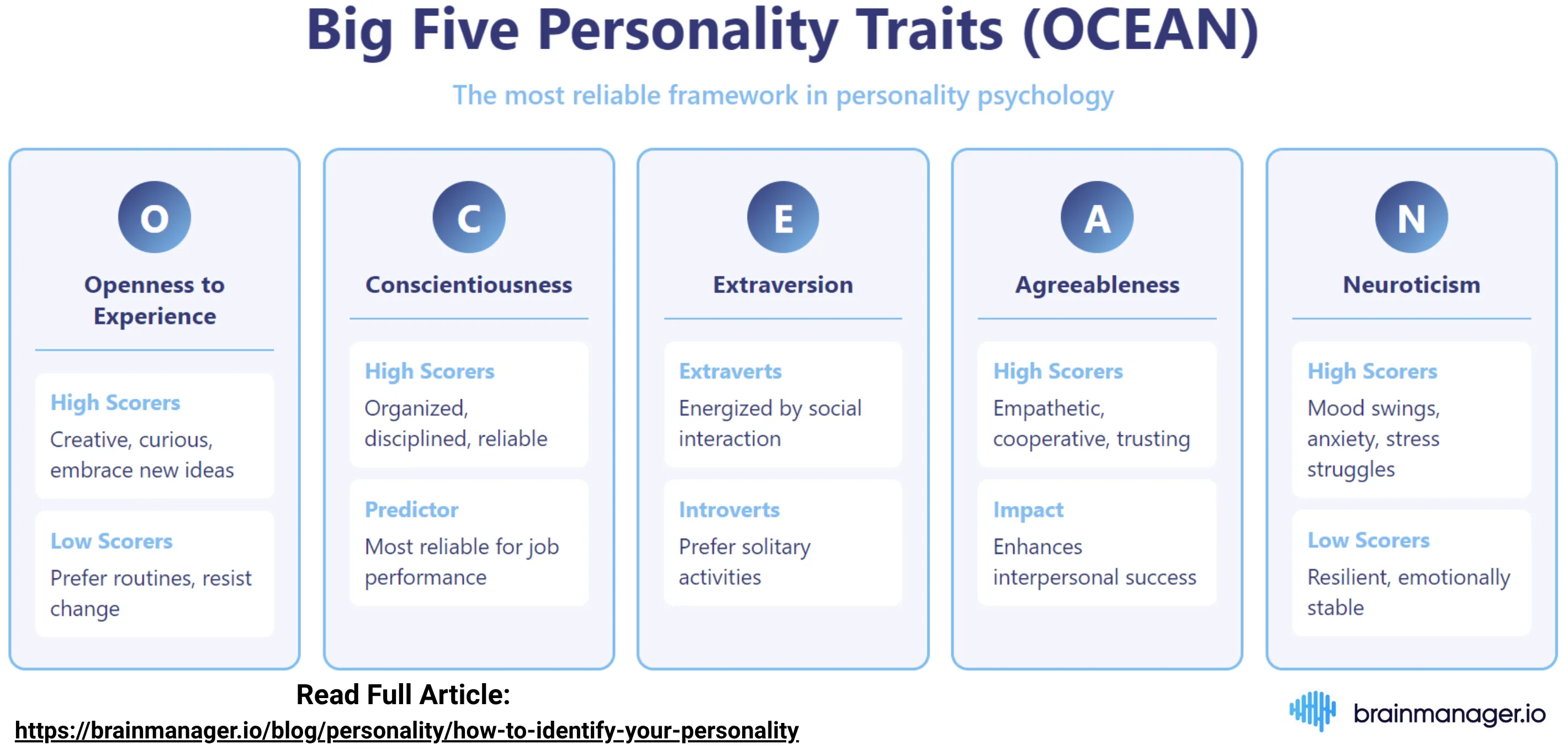
This quintet of characteristics profoundly influences forecasting outcomes relevant to life events such as well-being and social relationships. As we will now outline, this makes it especially beneficial in various life contexts, including those requiring assistance from a mental health professional.
Do you want to determine your personality profile? Consider taking BrainManager’s Big-5 personality test to get an accurate idea of what makes your psychological core.
Openness to Experience
This personality trait denotes a proclivity for innovation, creativity, and a keen interest in embracing fresh concepts. Those who score highly on openness usually excel in communication and leadership skills. Individuals with lower scores tend to favor routines. For example, as they might resist alterations, they prefer tried-and-true learning methods.
Conscientiousness
Conscientiousness is the most reliable predictor of job performance. Individuals with high levels of this trait typically show remarkable diligence, strong control over their impulses, and a propensity for organization and responsibility.
Extraversion
Extraverts enjoy engaging with the outside world and actively seek out social encounters. They draw energy from group activities, which is why the best jobs for extroverts involve a lot of interpersonal interactions.
Conversely, introverts might find these interactions exhausting. They tend to prefer activities they can undertake alone, so they sometimes excel in business careers requiring dedication and focus.
Agreeableness
Empathy, cooperation, and the capacity to establish beneficial relationships are all components of agreeableness. Highly agreeable individuals tend to be empathetic and cooperative, enhancing their success in interpersonal connections.
Neuroticism
Neuroticism is associated with mood swings and instability. Individuals high in this trait often struggle with stress management, leading to increased anxiety and other adverse responses to stress.
On the other hand, those low in neuroticism exhibit resilience and stability, making them better equipped to handle life’s challenges.
Myers-Briggs Type Indicator (MBTI): Sixteen Personality Factor Questionnaire
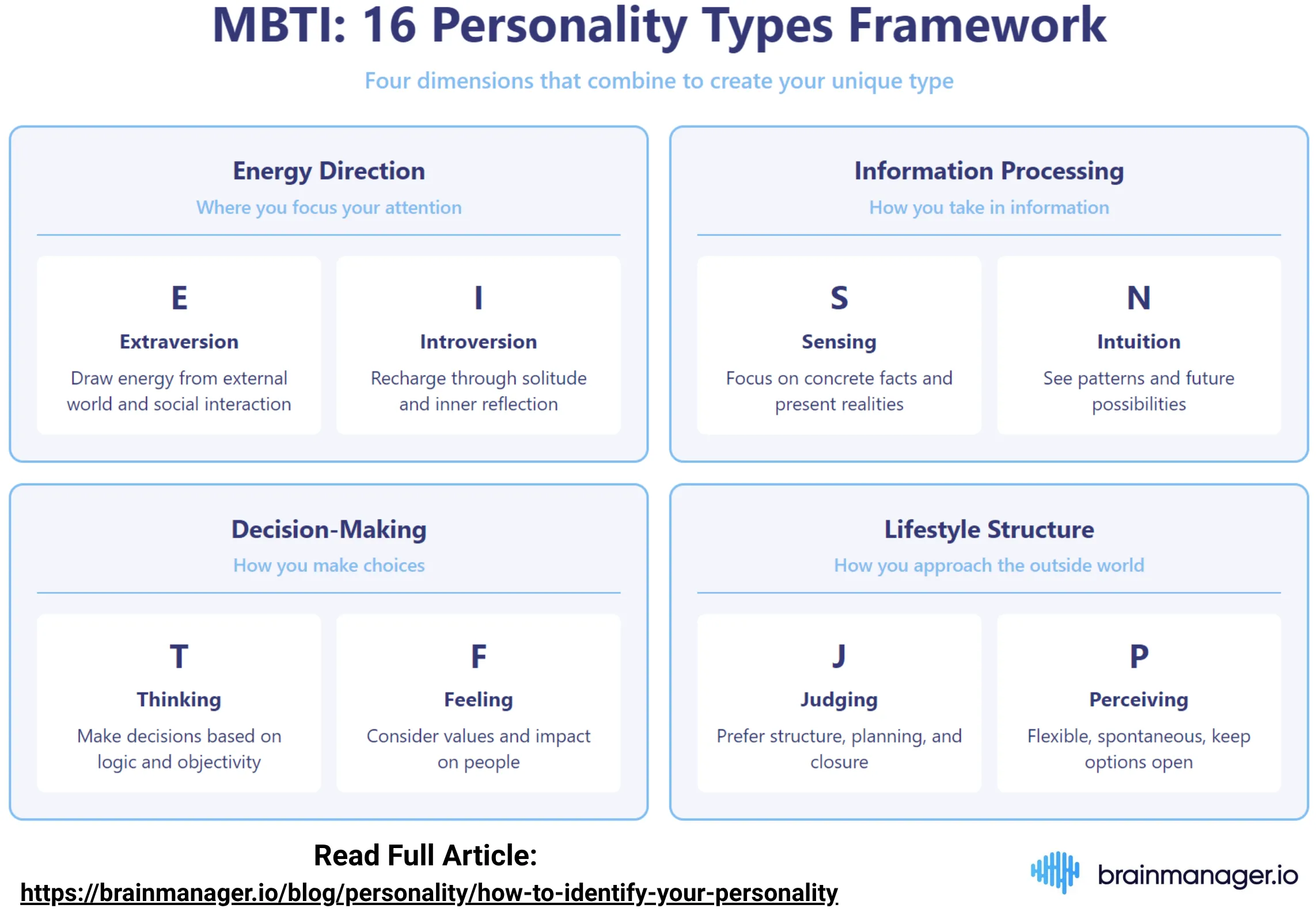
The Myers-Briggs Type Indicator, commonly called the MBTI, is a popular personality measurement that divides people into one of 16 distinct personality types. This classification is grounded in four dichotomies inspired by the psychological theories of Carl Jung.
This personality categorization identifies individual tendencies in perception and decision-making processes, making it an essential resource for personal growth and career planning. MBTI typing can also be used to understand relationship compatibility.
If you are curious about your personality type, the BrainManager’s 16 Personality Test is based on the Myers-Briggs Type Indicator.
The Four Dimensions of MBTI
Each dimension of the Myers-Briggs test represents a spectrum of preferences. Understanding these dimensions and their combinations helps you recognize your unique personality type and how it influences your interactions and decision-making processes.
The dimensions of the MBTI are:
- Extraversion (E) – Introversion (I)
- Sensing (S) – Intuition (N)
- Thinking (T) – Feeling (F)
- Judging (J) – Perceiving (P)
Practical Uses of MBTI
The MBTI is a personality test widely used in job recruitment and selection to improve teamwork and advance managers’ outcomes. Individuals can also use information gathered from the MBTI to help them find careers that best fit their personality.
Research has confirmed that the MBTI is used to develop better self-understanding and awareness of various aspects of personality.
The Myers-Briggs Type Indicator has proven to be a powerful tool for fostering better relationships. Research studies have shown that it enhances how people understand and connect with one another, leading to stronger interactions and boosting self-confidence in the process.
Limitations of MBTI
While the MBTI is one of the most widely used personality inventories, it has been scrutinized for its dependability and soundness.
One of its main limitations is its low reliability. Myers and Briggs did not receive formal education in psychology, so they lacked the methodological rigor needed to develop an accurate personality assessment.
Given these shortcomings, consider the MBTI as merely one option among various instruments for self-exploration instead of treating it as an absolute measure of assessment.
The Enneagram: The Unique Shades of Nine Personality Types
The Enneagram framework classifies people into nine separate types, each defined by their own motivations and behaviors.
As an inclusive test for self-discovery, our Enneagram test helps you identify strengths and weaknesses and sheds light on why you respond the way you do.
Understanding Who You Are as a Person Through the Nine Types
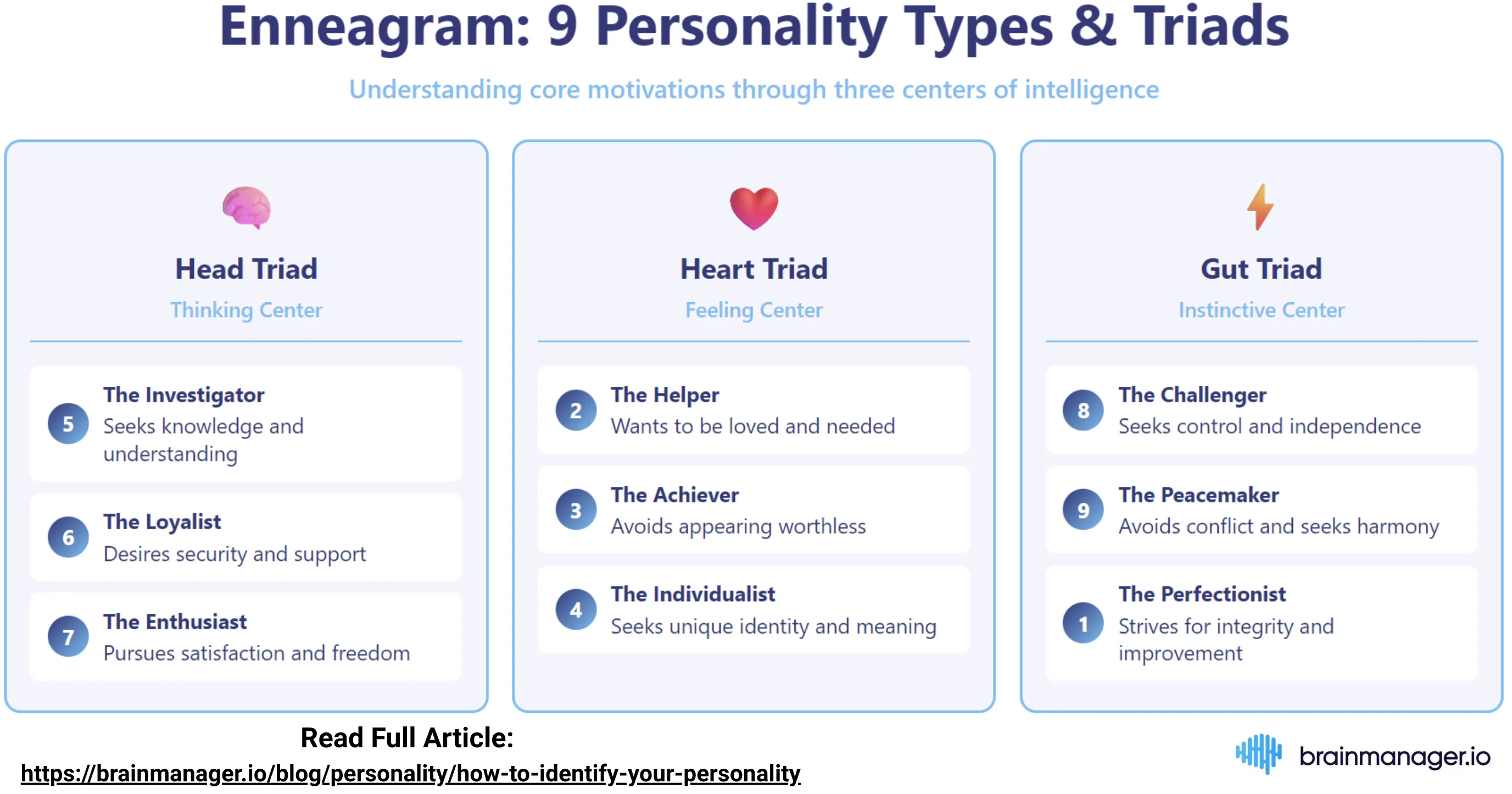
The Enneagram consists of nine personality types grouped into three triads: head, heart, and gut.
Each type has unique motivations and behaviors. When you identify your core motivation, this understanding can be helpful in making the right life decisions. For example, Type 2, the Giver, who is motivated to be liked and help others, will likely enjoy jobs that help people.
Type 3 is the Achiever who fears being seen as worthless. Therefore, the Enneagram test items here provide invaluable insight into dynamics that often affect their decisions in friendships and romantic relationships.
The Role of Wings and Arrows
In the Enneagram model, wings and arrows introduce additional dimensions to one’s personality profile by showcasing how an individual’s actions can vary in response to times of challenge or advancement.
The concept of wings refers to nearby personality types that may amplify or alter the primary type’s strengths and weaknesses.
Meanwhile, arrows illustrate how a person might change their behavior along specific trajectories when confronting stress or during periods of personal development.
Using the Enneagram for Personal Growth
Self-reports during the Enneagram assessment can raise self-awareness and nurture stronger connections with others. The results can illuminate areas for development, thus contributing to personal growth and improving the dynamics of interpersonal relationships.
Career Personality Tests: Finding the Ideal Job Matching an Individual’s Personality
If you’re unhappy with your job, one chief reason might be a mismatch between your personality and your career path.
Personality assessments are crucial in guiding people toward their optimal careers. Career-focused personality tests determine key strengths, areas for improvement, and passions. Matching personality with job requirements enhances job satisfaction and improves work performance.
Do you want to understand who you are as a professional? BrainManager’s Career Test will measure your unique personality type and interests to suggest suitable career paths. This test is based on Holland’s career interest model coupled with aspects of the Big 5 personality model to provide you with an informative approach to career choice.
Holland’s RIASEC Model
Holland’s RIASEC model organizes professional preferences into six themes: Realistic, Investigative, Artistic, Social, Enterprising, and Conventional (hence the abbreviation RIASEC). This framework aligns various personality traits and interests with corresponding job categories to assist people in identifying vocations that complement their strengths.
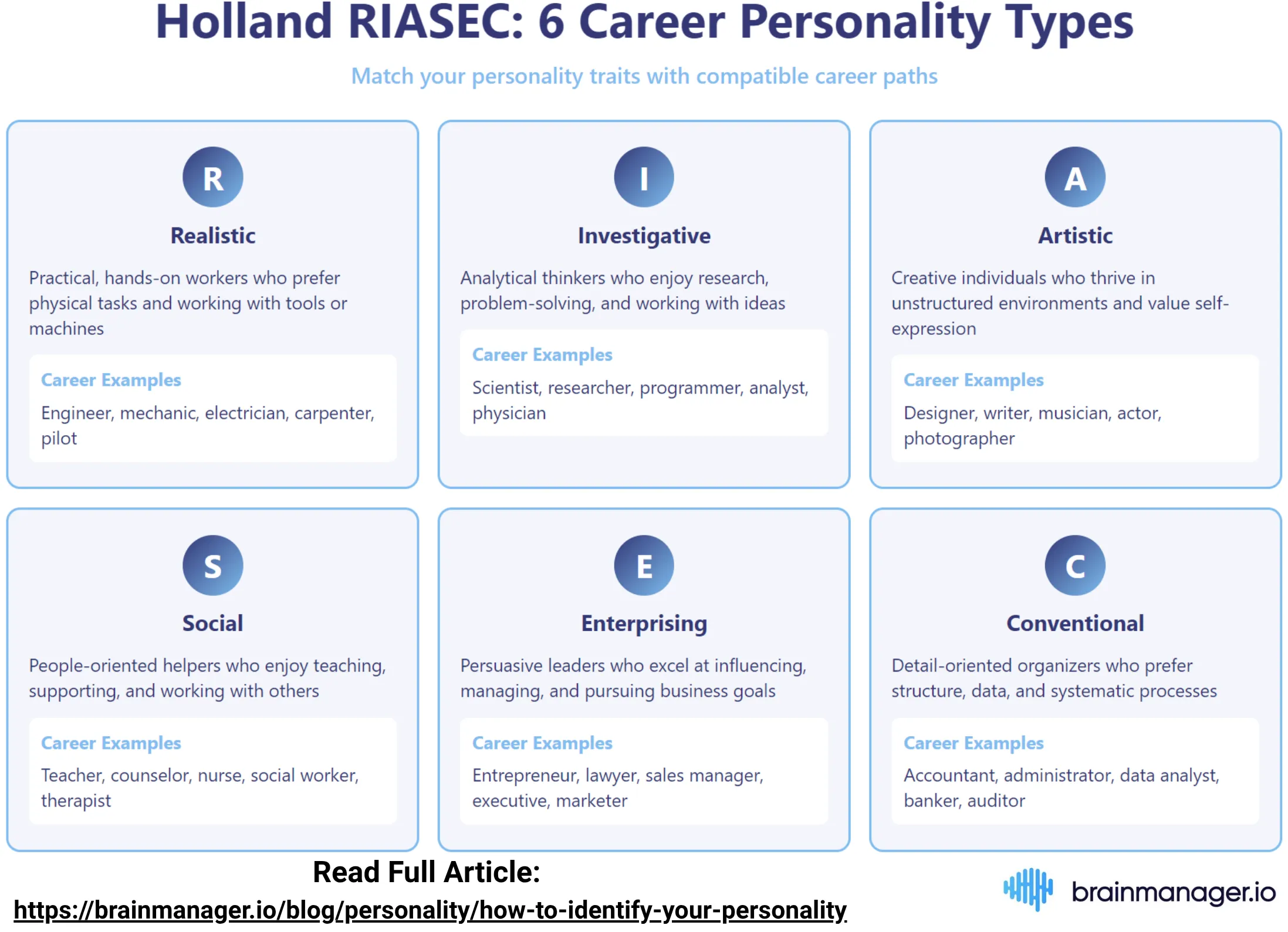
This system has guided individuals toward compatible career paths for over six decades, helping them achieve success and fulfillment. Research studies show that when work values and personality characteristics align with the job description, most people feel content and are more motivated.
Take, for example, Realistic personalities. They flourish in roles, leveraging their practical attitude. Conversely, those with an Artistic personality are naturally adept at thriving in creative fields.
Love Languages: Your Love Personality Test
The notion of love languages, presented by Gary Chapman in 1992, can significantly enhance interpersonal bonds through improved communication and relationship satisfaction.
This concept provides an answer to questions asked by couples who are genuinely in love but still sometimes feel rejected and unappreciated.
Chapman’s theory assumes that we all express love in one or two of five ways, called love languages. We also more readily respond to others’ expressions of love when our partner speaks our dominant love language. Here are those languages.
The Five Love Languages
There are five widely acknowledged love languages confirmed in research studies, which include:
- Words of Affirmation
- Quality Time
- Acts of Service
- Receiving Gifts
- Physical Touch
These love languages represent different ways every person gives and experiences love, influencing how they bond with their significant others.
For example, verbally expressing affection means your love language is Words of Affirmation. Conversely, if you tend to convey love through helpful actions, your dominant love language is likely Acts of Service.
Discovering Your Love Language
Understanding your love language is critical for fostering contentment in relationships. It addresses emotional necessities while enhancing dialogue with your significant other.
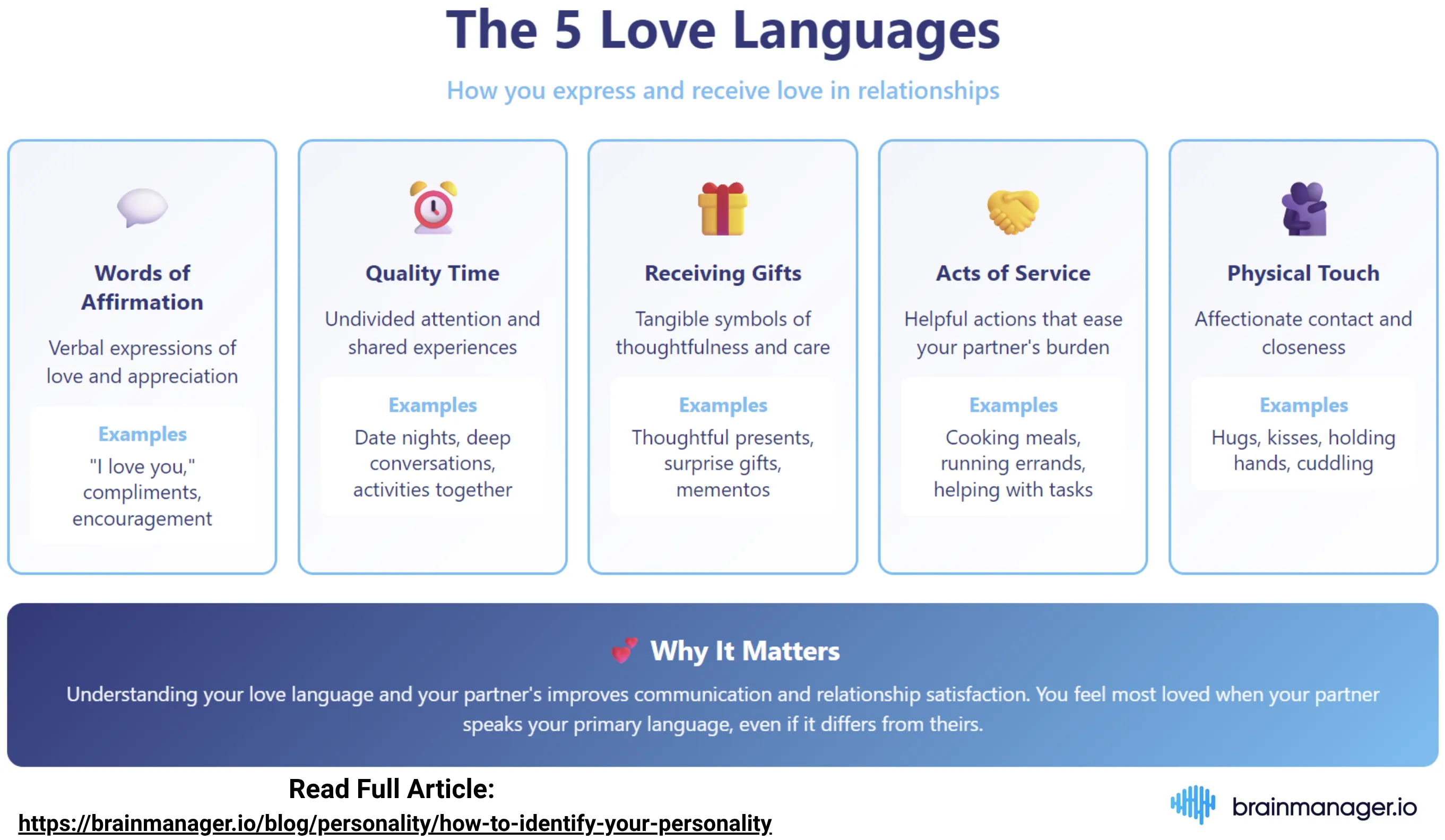
Introspection is crucial to uncovering your love language. Reflect on how you demonstrate affection. Take notes to describe what actions make you feel valued to pinpoint your primary way of expressing and receiving love.
However, let’s remember what’s the main purpose of a personality test. It is to present a reliable measure of its subject. Therefore, take our Love Languages test if you want to know. We designed it to shed light on your romantic preferences and how you engage emotionally.
Personality Tests as Tools to Get Answers and Set an Accurate Course for Fulfilled Life
Understanding yourself is the first step toward personal growth and meaningful relationships. Personality tests offer a structured way to define your traits and motivations beyond casual self-reflection or feedback from others. They provide evidence-based insights that can guide your decisions, whether in career, relationships, or self-improvement.
The difference between personality quizzes and tests lies in their depth and reliability. While a quiz might give quick, entertaining insights, personality tests are scientifically designed tools to measure your traits accurately. This precision helps you chart a course toward a more fulfilled life by revealing strengths, weaknesses, and areas for growth.
BrainManager’s personality tests were expertly designed to help you unlock more profound insights, paving the way for personal and professional success. Coupled with an extensive knowledge base to support your path, our resources give you all you need to create the life you deserve!


Return to Blog


